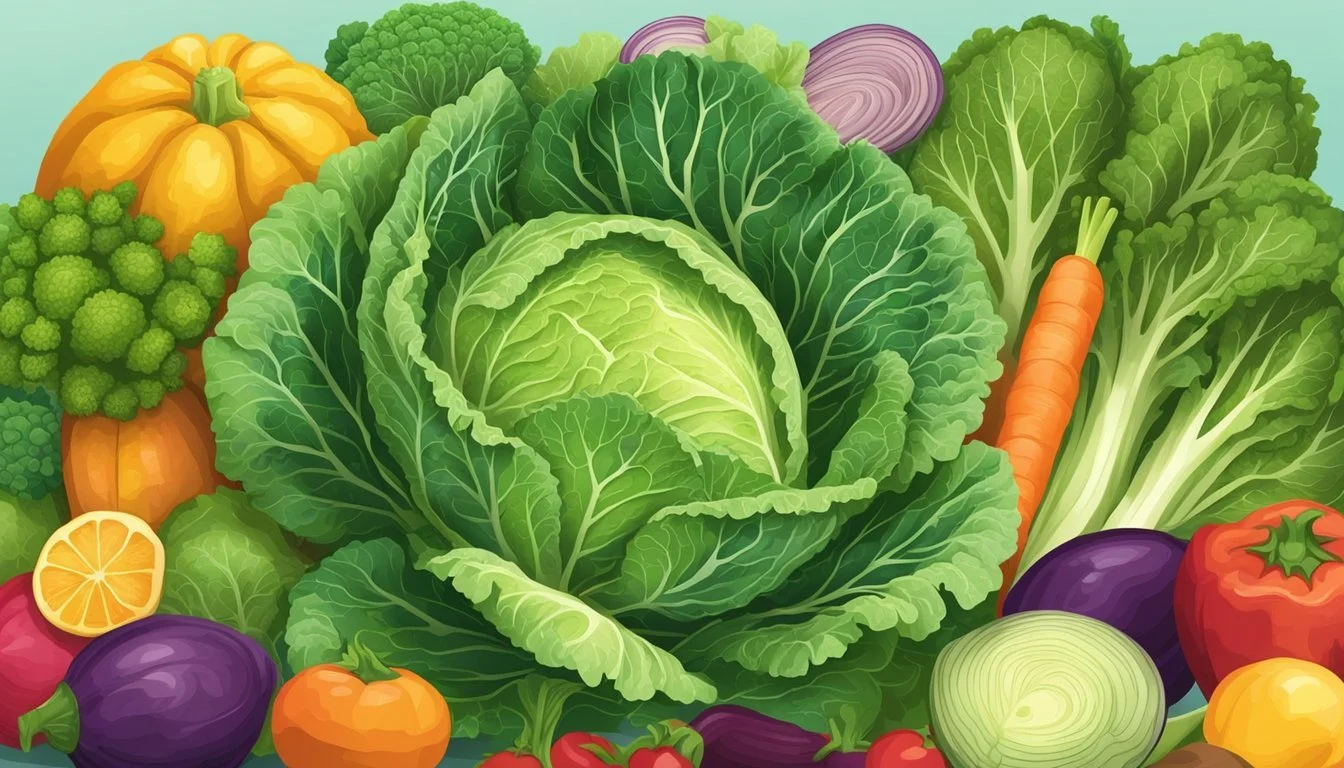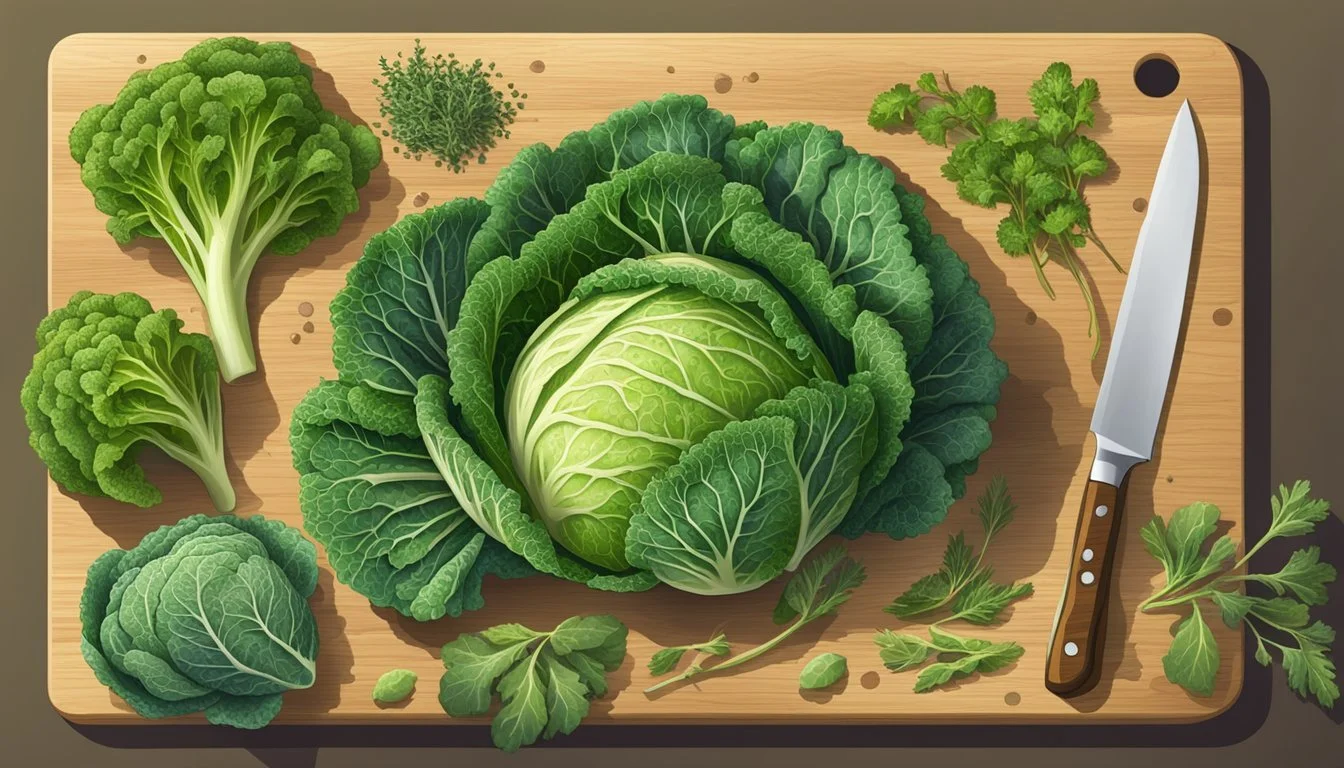What Are the Health Benefits of Savoy Cabbage?
Unveiling Nutritional Advantages
Savoy cabbage, with its distinctive crinkled leaves and mild flavor, is not just a versatile culinary ingredient but also a powerhouse of nutrients. This variety of cabbage is an excellent source of a variety of vitamins and minerals, including vitamins A, C, K, and B6, as well as iron, manganese, folate, potassium, calcium, and magnesium. Its low calorie content combined with a rich nutritional profile makes savoy cabbage a valuable addition to a health-conscious diet.
The health benefits of savoy cabbage extend beyond its nutrient richness. It is high in fiber which promotes digestive health, and it also provides proteins, a macronutrient essential for building and repairing tissues. The presence of antioxidants in savoy cabbage, particularly phytonutrients, plays a role in protecting the body against oxidative stress, which can lead to chronic diseases. Additionally, consumption of savoy cabbage may contribute to heart health due to its potential role in lowering blood pressure, thanks in part to its potassium content.
Savoy cabbage's contribution to diet is not only rooted in its extensive nutrient content but also in its inclusion in various cuisines. Whether added to soups, stir-fries, or enjoyed as a steamed side dish, it imparts a hearty texture and enhances meals with its mildly sweet flavor. The versatility of savoy cabbage ensures that it can be a part of daily nutrition, aiding in maintaining a healthy and balanced diet.
Nutritional Profile of Savoy Cabbage
Savoy cabbage is a variety packed with essential nutrients vital for maintaining good health. It serves as a rich source of various vitamins and minerals while providing beneficial fiber and macronutrients.
Vitamins and Minerals
Savoy cabbage is particularly high in Vitamin K, with a 70-gram serving offering 40.17% of the daily recommended value. It also provides a significant amount of Vitamin C, essential for immune function, skin health, and antioxidant properties, contributing 24.11% of the daily requirement. Other vitamins include Vitamin B6 and Vitamin B9 (folate), crucial for brain health and metabolism. As for minerals, savoy cabbage contains calcium, potassium, iron, and magnesium, which support bone health, blood pressure regulation, oxygen transport, and enzyme function, respectively.
Fiber and Macronutrients
The macronutrient profile of savoy cabbage includes a low-calorie count with a mere 19 calories per 70 grams, a modest 1.4 grams of protein, and about 0.07 grams of fat, making it a suitable option for weight management. Carbohydrates account for 4.27 grams, out of which dietary fiber is 2.2 grams. This fiber is important for digestive health and can help promote satiety. Moreover, the total sugars are quite low, at 1.59 grams.
Health Benefits
Savoy cabbage is celebrated for its dense nutrient profile and its capacity to bolster overall wellness, particularly in supporting immune function, heart health, and digestion. It contains compounds that have been associated with cancer prevention and anti-inflammatory properties.
Supports Immune Function
Savoy cabbage is a strong source of vitamin C, an antioxidant critical for the immune system. It helps in the production of white blood cells, which are vital in defending the body against pathogens.
Promotes Heart Health
Rich in potassium, Savoy cabbage contributes to maintaining healthy blood pressure, a key component in heart disease prevention. Its high fiber content also helps manage cholesterol levels, thus promoting heart health.
Aids in Digestion
The presence of both soluble and insoluble fiber in Savoy cabbage facilitates good digestive health. Soluble fiber can assist in maintaining appropriate levels of cholesterol, while insoluble fiber helps in regular bowel movements.
Cancer Prevention and Anti-Inflammatory Properties
Phytochemicals like flavonoids, found in Savoy cabbage, have antioxidant properties that may help combat the effects of free radicals and reduce chronic inflammation, potentially lowering the risk of cancer.
Dietary Considerations and Serving Ideas
Savoy cabbage is a versatile and nutrition-rich vegetable that fits well into a balanced diet, particularly for its high dietary fiber content and low-calorie profile. Proper integration into meals can enhance both the nutritional value and the flavor of various dishes.
Incorporating into Meals
Savoy cabbage can be easily incorporated into a variety of meals. It is commonly used raw in salads, providing a crunchy texture and a slightly sweet flavor. For warm dishes, cooking savoy cabbage in soups and stews allows it to soften and meld with other ingredients, enhancing the overall dish while maintaining its nutritional benefits. Its tender leaves can also be used as wraps for fillings, offering a low-calorie and low-sodium alternative to traditional wraps.
Salads: Toss chopped Savoy cabbage into garden or slaw salads.
Soups and Stews: Add shredded Savoy cabbage in the last minutes of cooking to retain texture and nutrients.
Steamed Cabbage: Steam leaves and stuff with a mixture of grains, proteins, and seasonings.
Sautéed Cabbage: Sauté with garlic and onions as a simple side dish.
Caloric Information and Dietary Fiber
When considering weight management and a healthy diet, Savoy cabbage is a fitting choice due to its low-calorie count and high fiber content.
Serving Size: 70 grams
Calories: 19
Dietary Fiber: 2.2 grams
The fiber in Savoy cabbage contributes to satiety, which can prevent overeating. It also aids in digestion and supports regular bowel movements. The low calorie count makes it an excellent option for calorie-conscious individuals or those aiming to manage their weight.
Culinary Uses and Flavor Profile
Savoy cabbage, a variety of Brassica oleracea, is distinguished by its crinkly leaves and mild, earthy flavor. It's versatile in the kitchen, enhancing dishes without overpowering them. The culinary uses and flavor profile of savoy cabbage reflect its adaptability and compatibility with a range of ingredients and cooking methods.
Cabbage in Global Cuisine
Savoy cabbage is embraced globally for its texture and taste. In Europe, it's a staple in hearty winter dishes, while in Asia, its leaves are often used as wraps or included in stir-fries. Savoy cabbage's relatives, such as broccoli, kale, cauliflower, Brussels sprouts, collard greens, and bok choy, share its ability to adapt to various climates and soil conditions, contributing to their worldwide culinary presence.
Germany: Savoy cabbage is fermented to make sauerkraut.
Korea: It is a key ingredient in kimchi, although traditionally Napa cabbage is used.
Eastern Europe: It stars in comforting cabbage soup.
Americas: It's shredded for coleslaw or enjoyed as a side dish.
Preparation Techniques
The preparation of savoy cabbage is crucial in achieving the desired flavor and texture. This cabbage can be enjoyed raw or cooked.
Raw: Retains more of its mild flavor and can be shredded into salads or used in coleslaw.
Cooking: Methods such as blanching, sauteing, or stir-frying enhance its flavor and tenderness, making it a fitting component in warm dishes.
Pairings and Combinations
Savoy cabbage pairs well with a broad array of ingredients, allowing cooks to create balanced and nutritious meals. It complements both bold and subtle flavors, and can be combined with meats, grains, and other vegetables.
Meats: Chicken, pork, and beef
Grains: Rice, barley, and quinoa
Vegetables: Carrots, onions, and bell peppers
When cooked, savoy cabbage can develop a sweeter, more complex taste, perfect for pairing with stronger flavors such as garlic or caraway seeds. It can also be balanced by the acidity of ingredients like apple cider vinegar or citrus juice in dressings and marinades.
Frequently Asked Questions
Savoy cabbage is hailed for its nutritional profile, offering various health benefits. This section addresses common inquiries regarding its consumption and associated advantages.
What nutritional advantages does savoy cabbage offer for skin health?
Savoy cabbage contains vitamins C and E, which are potent antioxidants important for skin health. Vitamin C aids in the production of collagen, promoting skin elasticity and reducing the appearance of wrinkles.
Can consuming savoy cabbage leaves regularly benefit one’s digestive system?
The dietary fiber in savoy cabbage supports the digestive system by promoting regular bowel movements and contributing to a healthy gut microbiota.
How can savoy cabbage consumption potentially affect women's health?
Women may benefit from savoy cabbage's high levels of folate, a crucial nutrient during pregnancy for fetal development. It also contributes to bone health due to its vitamin K content.
In terms of serving size, how much cabbage is recommended for daily intake?
There isn't a strict serving size for savoy cabbage, but incorporating it as a part of a balanced diet in dishes such as salads, stews, or as a side can contribute to daily nutrient intake.
What are the distinctive health properties of savoy cabbage?
Savoy cabbage stands out due to its high vitamin K content essential for blood clotting and bone metabolism, and it is also a good source of potassium and manganese, which support heart health and protect against free radical damage.
Does savoy cabbage provide more health benefits when eaten raw or cooked?
Raw savoy cabbage retains all of its vitamins and minerals, providing the most direct benefit. However, cooking may aid in digestion and enhance flavor while still delivering significant health benefits.







